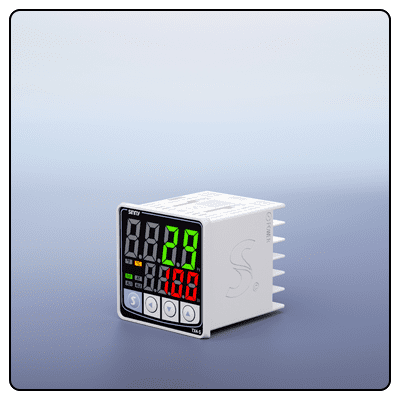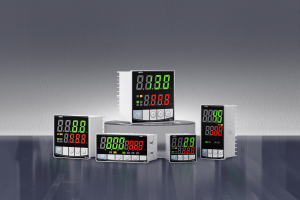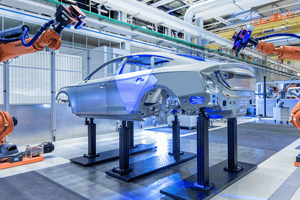The Benefits of Using Industrial Temperature Controllers in Manufacturing
Discover the benefits of using industrial temperature controllers in manufacturing. Learn how they enhance process stability, increase efficiency, save energy, improve safety, and support sustainability.
1. Introduction
When it comes to manufacturing, precise temperature regulation is of utmost importance. Temperature controllers play a vital role in maintaining ideal temperatures within certain parameters - guaranteeing product quality, operational efficiency, and overall safety across different processes. Manufacturers can increase control by installing industrial temperature controllers into their processes - reaping many advantages as a result.
2. Increased Process Stability
Consistent Product Quality: One of the primary advantages of industrial temperature controllers is consistent product quality. Manufacturers can ensure they produce products meeting stringent quality standards by keeping temperatures within the desired range. This consistency is particularly essential in industries like pharmaceuticals where even minute temperature shifts could compromise efficacy of final product - maintaining precise temperatures to guarantee product stability and efficacy is especially crucial in producing vaccines for example.
Reducing Variability: Temperature controllers help minimize process variability for more reliable outcomes in manufacturing environments, resulting in reduced defects and inconsistencies - costlier and longer-lasting results of inconsistency than previously estimated. By maintaining stable temperatures during each batch production run, temperature controllers ensure products are produced under similar conditions, reducing defect risks significantly; this feature is especially essential in food and beverage manufacturing sectors where consistent temperature management must ensure product safety and quality.
3. Increased Efficiency and Productivity
Optimized Operations: Precise temperature control can optimize manufacturing operations by ensuring processes run efficiently, with equipment operating more smoothly, lessening malfunction risk downtime risk and increasing throughput - leading to increased efficiency, productivity, and throughput - especially within chemical industries where maintaining proper temperatures during reactions can greatly enhance yield and reduce waste.
Minimized Downtime: Temperature issues in manufacturing processes can create costly downtime. Manufacturers can improve productivity by employing temperature controllers to prevent such problems and reduce downtime while decreasing equipment repair and production-loss expenses. Precision temperature controls during soldering processes for electronic parts production help prevent defects requiring costly rework, significantly reducing downtime costs and production losses.

4. Energy Savings
Energy Efficiency: Temperature controllers contribute significantly to energy savings by maintaining ideal temperatures. By keeping temperatures precisely in line, equipment doesn't have to work harder to compensate for temperature variations - thus leading to reduced operational costs and environmental footprint. Temperature controllers also offer opportunities to optimize heating/cooling cycles within HVAC systems, resulting in additional savings from increased efficiencies.
Cost Reduction: Reduced energy consumption can have significant financial advantages for manufacturers. Utilizing temperature controllers can significantly lower energy bills and operational expenses - money that can then be reinvested into other areas for enhanced productivity and efficiency. For instance, keeping precise temperature controls during molding processes in plastics industries may significantly cut back energy use while improving product quality, resulting in significant cost reductions and savings.
5. Increased Safety
Preventing Accidents: Temperature controllers play a crucial role in protecting workers and equipment by maintaining stable temperatures to reduce overheating risks or other temperature-related hazards, ensuring safe operations continue uninterrupted by overheating incidents or overheating equipment. They play an especially vital role when operating in industries where high temperatures pose safety threats to workers and equipment, such as metalworking, where heat treatment processes require precise temperature regulation to avoid accidents while safeguarding worker wellbeing.
Compliance With Safety Standards and Regulations: Many industries must abide by stringent safety standards and regulations. Temperature controllers help manufacturers comply by ensuring processes take place within safe temperature limits - this helps safeguard workers while also helping avoid costly fines or legal complications; in the pharmaceutical sector, for instance, maintaining precise temperature control is crucial in adhering to Good Manufacturing Practices (GMP), thus assuring product safety.
6. Environmental Sustainability
Reduced Emissions: Effective temperature control can directly impact emissions and the environmental footprint, producing less pollution overall and supporting sustainability initiatives. Maintaining optimal temperatures on equipment operation more efficiently with reduced emissions output resulting from operations contributes to cleaner environments and sustainability efforts, such as with automotive paint processes when precise temperature regulation reduces volatile organic compound (VOC) emissions for increased environmental sustainability initiatives.
Sustainable Practices: Temperature controllers support sustainable manufacturing practices by decreasing energy use and waste creation, thus decreasing environmental impact while improving efficiency of processes such as dyeing processes in textile industries - for instance, by maintaining precise temperature controls during dyeing processes with precise temperature controllers in dyeing processes to minimize both water consumption and energy waste consumption, helping manufacturers establish more environmentally responsible operations practices and contribute towards creating a greener future. For instance, maintaining precise temperature controls during these dyeing processes, in turn, promotes more eco-friendly practices within this sector.
7. Conclusion
In conclusion, industrial temperature controllers offer numerous benefits in manufacturing environments. They improve process stability, increase process efficiencies and productivity, save energy use, enhance safety, and promote environmental sustainability. Manufacturers can gain more control of their processes by investing in high-quality temperature controllers - giving their processes greater precision while giving a competitive advantage to the business in general. Investing in quality temperature control devices should prove worthwhile, with long-term business success and strategic, operational excellence realized due to decisions such as this implementation initiative.
8. Frequently Asked Questions
Q1. What Is an Industrial Temperature Controller?
A1: An industrial temperature controller is a device used to set and regulate desired temperatures within certain parameters in different manufacturing processes.
Q2: Can temperature controllers improve product quality?
A2: Temperature controllers help enhance quality by maintaining steady temperatures that ensure products are produced under ideal conditions, thus enhancing their quality and decreasing defects.
Q3: Can temperature controllers help lower my energy costs?
A3: Temperature controllers assist in cutting energy costs by maintaining optimal temperatures, as they use less power overall, which leads to reduced bills and operating expenses.
Q4: What safety benefits can temperature controllers bring to users?
A4: Temperature controllers help reduce overheating and other temperature-related hazards to ensure safe operations while adhering to safety standards.
Q5: How are temperature controllers supporting environmental sustainability?
A5: By optimizing temperature regulation, temperature controllers contribute to environmental sustainability by decreasing emissions and energy use - leading to smaller environmental footprints while encouraging sustainable practices.
- The Role of Industrial Temperature Controllers in Manufacturing
- Learn the Role of Industrial Temperature Controllers to Increase Safety





















